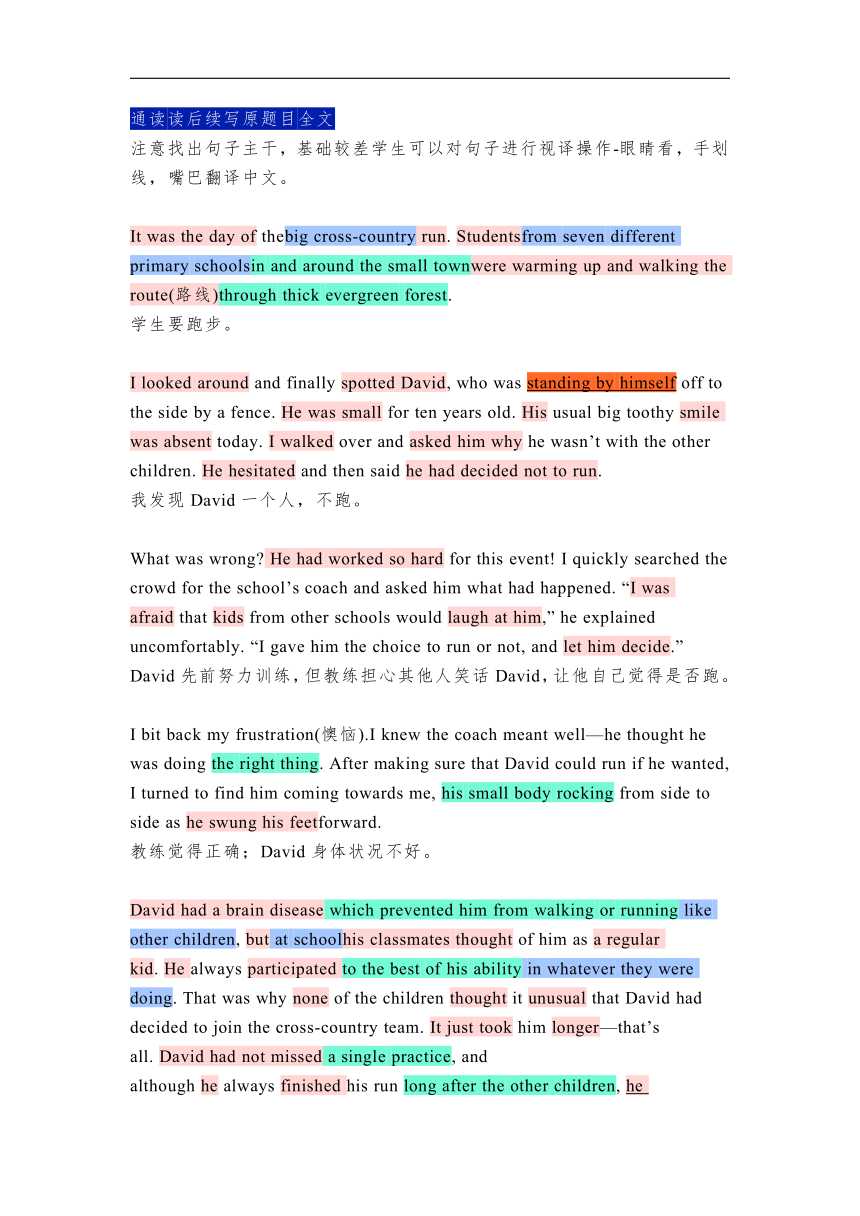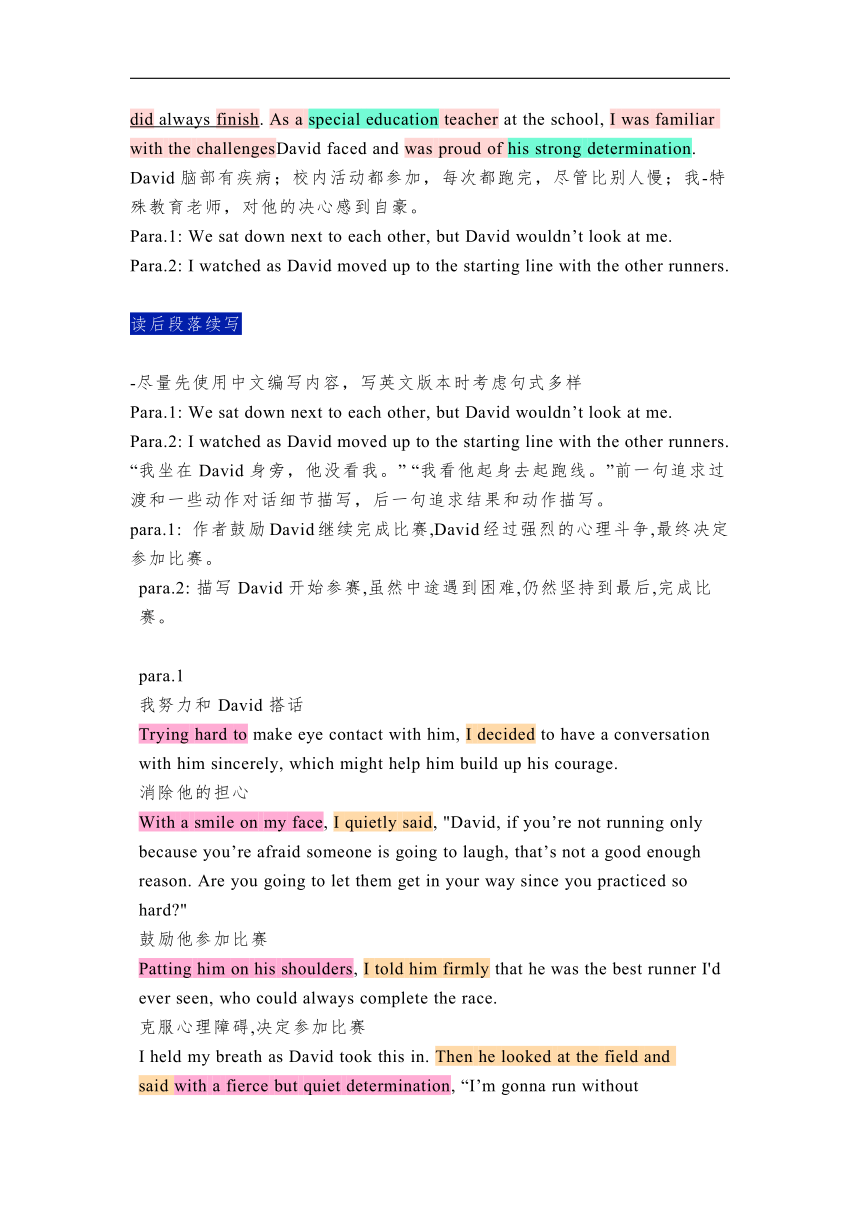2024届高考英语作文复习专项高考真题解析(2022年新高考I卷读后续写)讲义-
文档属性
| 名称 | 2024届高考英语作文复习专项高考真题解析(2022年新高考I卷读后续写)讲义- |

|
|
| 格式 | docx | ||
| 文件大小 | 21.8KB | ||
| 资源类型 | 教案 | ||
| 版本资源 | 通用版 | ||
| 科目 | 英语 | ||
| 更新时间 | 2024-04-05 10:54:34 | ||
图片预览


文档简介
通读读后续写原题目全文
注意找出句子主干,基础较差学生可以对句子进行视译操作-眼睛看,手划线,嘴巴翻译中文。
It was the day of thebig cross-country run. Studentsfrom seven different primary schoolsin and around the small townwere warming up and walking the route(路线)through thick evergreen forest.
学生要跑步。
I looked around and finally spotted David, who was standing by himself off to the side by a fence. He was small for ten years old. His usual big toothy smile was absent today. I walked over and asked him why he wasn’t with the other children. He hesitated and then said he had decided not to run.
我发现David一个人,不跑。
What was wrong He had worked so hard for this event! I quickly searched the crowd for the school’s coach and asked him what had happened. “I was afraid that kids from other schools would laugh at him,” he explained uncomfortably. “I gave him the choice to run or not, and let him decide.”
David先前努力训练,但教练担心其他人笑话David,让他自己觉得是否跑。
I bit back my frustration(懊恼).I knew the coach meant well—he thought he was doing the right thing. After making sure that David could run if he wanted, I turned to find him coming towards me, his small body rocking from side to side as he swung his feetforward.
教练觉得正确;David身体状况不好。
David had a brain disease which prevented him from walking or running like other children, but at schoolhis classmates thought of him as a regular kid. He always participated to the best of his ability in whatever they were doing. That was why none of the children thought it unusual that David had decided to join the cross-country team. It just took him longer—that’s all. David had not missed a single practice, and although he always finished his run long after the other children, he did always finish. As a special education teacher at the school, I was familiar with the challengesDavid faced and was proud of his strong determination.
David脑部有疾病;校内活动都参加,每次都跑完,尽管比别人慢;我-特殊教育老师,对他的决心感到自豪。
Para.1: We sat down next to each other, but David wouldn’t look at me.
Para.2: I watched as David moved up to the starting line with the other runners.
读后段落续写
-尽量先使用中文编写内容,写英文版本时考虑句式多样
Para.1: We sat down next to each other, but David wouldn’t look at me.
Para.2: I watched as David moved up to the starting line with the other runners.
“我坐在David身旁,他没看我。” “我看他起身去起跑线。”前一句追求过渡和一些动作对话细节描写,后一句追求结果和动作描写。
para.1: 作者鼓励David继续完成比赛,David经过强烈的心理斗争,最终决定参加比赛。
para.2: 描写David开始参赛,虽然中途遇到困难,仍然坚持到最后,完成比赛。
para.1
我努力和David搭话
Trying hard to make eye contact with him, I decided to have a conversation with him sincerely, which might help him build up his courage.
消除他的担心
With a smile on my face, I quietly said, "David, if you’re not running only because you’re afraid someone is going to laugh, that’s not a good enough reason. Are you going to let them get in your way since you practiced so hard "
鼓励他参加比赛
Patting him on his shoulders, I told him firmly that he was the best runner I'd ever seen, who could always complete the race.
克服心理障碍,决定参加比赛
I held my breath as David took this in. Then he looked at the field and said with a fierce but quiet determination, “I’m gonna run without considering others feelings.”
para.2
听到枪声就开跑
On hearing the shot of the strating gun, David shot from the strating point.
接近终点一摔倒
But near the end of the race, he tripped and fell flat on the ground, which made my heart sank.
鼓励打气接着跑
As I started to shout encouragement, other voices around me took up the call. “Come on David; you can do it!”
一波三折达终点
David picked himself up and started again until he crossed the finish line to wild cheers and applause.
情感升华
Exhausted as he was, David felt his time and effort worthwhile. What an unforgettable day!
自测评价
倒装:hardly, so that, as
状语:done/ doing, 形容词状语,with 状语,独立主格做状语
无灵主语:情绪名词做主语,时间名词做主语
定语从句:who、which引导的非限
名词性从句:what引导情绪类名词性从句
参考答案:
We sat down next to each other, but David wouldn’t look at me. [我安抚的动作、语言呼应原文]I placed my hand on his shoulder and said, “Just participate to the best of your ability. I believe in you.” [他吃惊的表情]He looked at me, his eyes widening. [我的鼓励层层递进] “You know you are not special in my eyes, and I am always proud of your strong determination.” I encouraged him with a sincere tone. [他受到鼓舞]He moved his lips several times but couldn’t say a word. I just smiled at him. “So do you still decide to give up the running ” [衔接下一段开头语] “No.” he said, looking back at the running track. “Then go you!” I said. He ran for his warm-up exercise.
I watched as David moved up to the starting line with the other runners. The race began. [强调比赛的困难]It seemed that the runway was extremely long for David with a heart disease. [突出David的品质]But he ran as if he had forgotten all his weaknesses. As the other runners charged to the finish line, I felt a little nervous, fearing that he would be laughed at. [同学们的表现照应原文“thought of him as a regular kid”]However, classmates all appeared on the racing track, cheering for him. “Come on! We are proud of you!” they shouted enthusiastically. Eventually, David made it. [照应原文人物特征]As he was announced to win the 18th, I saw his usual toothy smile returned. [点明主旨]He eventually proved himself to be a strong-willed man even though he wasn’t the first.
注意找出句子主干,基础较差学生可以对句子进行视译操作-眼睛看,手划线,嘴巴翻译中文。
It was the day of thebig cross-country run. Studentsfrom seven different primary schoolsin and around the small townwere warming up and walking the route(路线)through thick evergreen forest.
学生要跑步。
I looked around and finally spotted David, who was standing by himself off to the side by a fence. He was small for ten years old. His usual big toothy smile was absent today. I walked over and asked him why he wasn’t with the other children. He hesitated and then said he had decided not to run.
我发现David一个人,不跑。
What was wrong He had worked so hard for this event! I quickly searched the crowd for the school’s coach and asked him what had happened. “I was afraid that kids from other schools would laugh at him,” he explained uncomfortably. “I gave him the choice to run or not, and let him decide.”
David先前努力训练,但教练担心其他人笑话David,让他自己觉得是否跑。
I bit back my frustration(懊恼).I knew the coach meant well—he thought he was doing the right thing. After making sure that David could run if he wanted, I turned to find him coming towards me, his small body rocking from side to side as he swung his feetforward.
教练觉得正确;David身体状况不好。
David had a brain disease which prevented him from walking or running like other children, but at schoolhis classmates thought of him as a regular kid. He always participated to the best of his ability in whatever they were doing. That was why none of the children thought it unusual that David had decided to join the cross-country team. It just took him longer—that’s all. David had not missed a single practice, and although he always finished his run long after the other children, he did always finish. As a special education teacher at the school, I was familiar with the challengesDavid faced and was proud of his strong determination.
David脑部有疾病;校内活动都参加,每次都跑完,尽管比别人慢;我-特殊教育老师,对他的决心感到自豪。
Para.1: We sat down next to each other, but David wouldn’t look at me.
Para.2: I watched as David moved up to the starting line with the other runners.
读后段落续写
-尽量先使用中文编写内容,写英文版本时考虑句式多样
Para.1: We sat down next to each other, but David wouldn’t look at me.
Para.2: I watched as David moved up to the starting line with the other runners.
“我坐在David身旁,他没看我。” “我看他起身去起跑线。”前一句追求过渡和一些动作对话细节描写,后一句追求结果和动作描写。
para.1: 作者鼓励David继续完成比赛,David经过强烈的心理斗争,最终决定参加比赛。
para.2: 描写David开始参赛,虽然中途遇到困难,仍然坚持到最后,完成比赛。
para.1
我努力和David搭话
Trying hard to make eye contact with him, I decided to have a conversation with him sincerely, which might help him build up his courage.
消除他的担心
With a smile on my face, I quietly said, "David, if you’re not running only because you’re afraid someone is going to laugh, that’s not a good enough reason. Are you going to let them get in your way since you practiced so hard "
鼓励他参加比赛
Patting him on his shoulders, I told him firmly that he was the best runner I'd ever seen, who could always complete the race.
克服心理障碍,决定参加比赛
I held my breath as David took this in. Then he looked at the field and said with a fierce but quiet determination, “I’m gonna run without considering others feelings.”
para.2
听到枪声就开跑
On hearing the shot of the strating gun, David shot from the strating point.
接近终点一摔倒
But near the end of the race, he tripped and fell flat on the ground, which made my heart sank.
鼓励打气接着跑
As I started to shout encouragement, other voices around me took up the call. “Come on David; you can do it!”
一波三折达终点
David picked himself up and started again until he crossed the finish line to wild cheers and applause.
情感升华
Exhausted as he was, David felt his time and effort worthwhile. What an unforgettable day!
自测评价
倒装:hardly, so that, as
状语:done/ doing, 形容词状语,with 状语,独立主格做状语
无灵主语:情绪名词做主语,时间名词做主语
定语从句:who、which引导的非限
名词性从句:what引导情绪类名词性从句
参考答案:
We sat down next to each other, but David wouldn’t look at me. [我安抚的动作、语言呼应原文]I placed my hand on his shoulder and said, “Just participate to the best of your ability. I believe in you.” [他吃惊的表情]He looked at me, his eyes widening. [我的鼓励层层递进] “You know you are not special in my eyes, and I am always proud of your strong determination.” I encouraged him with a sincere tone. [他受到鼓舞]He moved his lips several times but couldn’t say a word. I just smiled at him. “So do you still decide to give up the running ” [衔接下一段开头语] “No.” he said, looking back at the running track. “Then go you!” I said. He ran for his warm-up exercise.
I watched as David moved up to the starting line with the other runners. The race began. [强调比赛的困难]It seemed that the runway was extremely long for David with a heart disease. [突出David的品质]But he ran as if he had forgotten all his weaknesses. As the other runners charged to the finish line, I felt a little nervous, fearing that he would be laughed at. [同学们的表现照应原文“thought of him as a regular kid”]However, classmates all appeared on the racing track, cheering for him. “Come on! We are proud of you!” they shouted enthusiastically. Eventually, David made it. [照应原文人物特征]As he was announced to win the 18th, I saw his usual toothy smile returned. [点明主旨]He eventually proved himself to be a strong-willed man even though he wasn’t the first.
